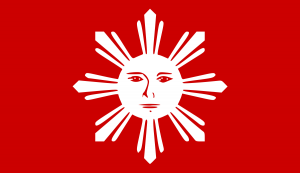Language/Tagalog/Vocabulary/Family
Family, or pamilya in Tagalog, plays a significant and vital role in an individual's life within Filipino culture. The Filipino family is known for its inseparability, inclusiveness, and tight-knit bonds, often having up to four generations living together in a single household. Whether there are three or thirteen people under the same roof, everyone is cherished and respected, and it is not uncommon for family members from all over the world to return home for Christmas or other special occasions. Such reunions can easily gather more than twenty or thirty people, and announcements for upcoming gatherings can occasionally be heard on the radio.
After learning about family in Tagalog, you might also be interested in exploring other related topics, such as Tagalog Science and Technology terms, Tagalog color vocabulary, and Tagalog hobbies and interests.
Main Vocabulary[edit | edit source]
In the Philippines, family is at the heart of society, playing a pivotal role in daily life and cultural traditions. The Filipino concept of family is not limited to immediate relatives, but also extends to a wider network of kin, including grandparents, aunts, uncles, and cousins. In this article, we will delve into the Tagalog vocabulary for various family members, equipping you with the tools to engage in conversations about your own family or learn more about the families of others.
- Pamilya - Family Ang pamilya ay importante sa Pilipino. (Family is important to Filipinos.)
- Tatay / Ama - Father Si Tatay ay nagtratrabaho sa opisina. (Father works at the office.)
- Nanay / Ina - Mother Si Nanay ay magaling magluto. (Mother is a good cook.)
- Kapatid - Sibling May dalawang kapatid si Maria. (Maria has two siblings.)
- Kuya - Older brother Si Kuya ay mabait at maalaga. (My older brother is kind and caring.)
- Ate - Older sister Ang Ate ko ay maganda at matalino. (My older sister is beautiful and smart.)
- Bunso - Youngest sibling Si Bunso ay laging pinapayuhan ng kanyang mga kapatid. (The youngest sibling is always advised by their older siblings.)
- Anak - Child Ang anak nila ay masipag at maparaan. (Their child is hardworking and resourceful.)
- Lolo - Grandfather Ang Lolo ko ay dating guro. (My grandfather was a teacher.)
- Lola - Grandmother Si Lola ay mahilig sa paghahalaman. (Grandmother loves gardening.)
- Tito - Uncle Ang Tito ko ay isang pulis. (My uncle is a police officer.)
- Tita - Aunt Si Tita ay may-ari ng isang tindahan. (My aunt owns a store.)
- Pamangkin - Niece/Nephew Ang pamangkin kong si Juan ay matalino. (My nephew Juan is smart.)
- Pinsan - Cousin Nagkikita kami ng aking mga pinsan tuwing Pasko. (We see our cousins every Christmas.)
- Hipag - Sister-in-law Ang hipag ko ay mabait at masayahin. (My sister-in-law is kind and cheerful.)
- Bayaw - Brother-in-law Ang bayaw ko ay mahusay na inhinyero. (My brother-in-law is an excellent engineer.)
- Asawa - Spouse Ang asawa ko ay isang dentista. (My spouse is a dentist.)
Summary table - Family words in Tagalog[edit | edit source]
| Tagalog | English |
|---|---|
| Ina/Nanay | Mother |
| Ama/Tatay | Father |
| Anak | Child |
| Kapatid | Sibling |
| Kuya | Elder Brother |
| Ate | Elder Sister |
| Panganay | Firstborn |
| Bunso | Youngest Child |
| Lola | Grandmother |
| Lolo | Grandfather |
| Tiya | Aunt |
| Tiyo | Uncle |
| Sanggol | Baby |
| Magulang | Parent |
| Ninuno | Ancestor (literary) |
- Note: Most of the words above are generally used in an affectionate tone, even when using them to address strangers. Filipinos usually call people on the street, or most of the time, people behind the counter, Kuya, Ate, Lola, or Lolo as a sign of politeness and endearment. Nanay and Tatay are also the affectionate versions of Ina and Ama, respectively.
Practice phrases - family members in Tagalog[edit | edit source]
| Tagalog | English |
|---|---|
| Si Meri ang aking Ina | Meri is my mother. |
| Tatay ko si Jun | My dad is Jun. |
| Ang kuya ko ay nasa ibang bansa | My brother is abroad (Lit. Brother mine is on other country). |
| Pumanaw na ang aking dalawang lolo | My two grandfathers are already dead. |
| Anak mo ba si Berto? | Is Berto your son? |
| Pupunta ba si Bunso sa ating pista? | Is the youngest child going to our fiesta? |
Videos in Tagalog about the family members[edit | edit source]
FAMILY MEMBERS in Tagalog (Filipino)[edit | edit source]
FAMILY MEMBERS IN TAGALOG | Basic Tagalog Language[edit | edit source]
FAMILY MEMBERS AND ETC. IN TAGALOG W/ HELPFUL TIPS[edit | edit source]
Authors[edit | edit source]
Videos[edit | edit source]
FAMILY MEMBERS IN TAGALOG - YouTube[edit | edit source]
Other Lessons[edit | edit source]
- Fruits
- Animals
- Food
- Clothes
- Counting and Numbers
- Feelings and Emotions
- Shapes
- Count from 1 to 10
- Animal


